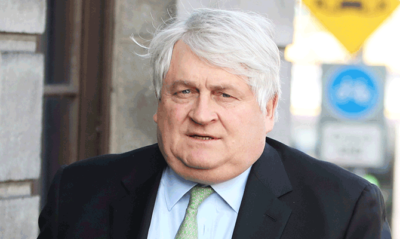
Denis O'Brien
THE ANNUAL Saint Patrick’s Day tour of America proved to be more trouble than it was worth for Enda Kenny’s government in 2012, a saga which took another, long awaited, turn this month.
Flanked by some of the nation’s best and brightest, An Taoiseach, fresh from his White House visit, appeared at the New York stock exchange on the morning of March 19. Under prominent branding of “Ireland Inc”, Kenny rang the bell in a less than subtle signal that his own “best little country” was now open for business.
What raised eyebrows at home instantly, and not just among a hard left rabble, was that this photo-op occurred just shy of one year since the publication of the Moriarty Tribunal’s final Report and that three places to Kenny’s right on Wall Street stood one Denis O’Brien. Writing in the Irish Independent, Michael McDowell wondered if this spectacle marked “a new departure in terms of public standards and accountability?”
Only days earlier, reports appeared in the media that a largely unknown building services company, Siteserv, had announced plans to sell the firm to the high profile billionaire via an Isle of Man registered vehicle, Millington. The initial article by Ciara O’Brien in the Irish Times noted that the sale was expected to be worth €45.4 million, a price “far less than the group’s €150 million bank debt.”
This write-off was of particular concern given the sum was owed to IBRC and a state then in the process of slashing the nation’s future. For a long time, the Government managed to maintain remarkably little interest in the Siteserv story, even as the amount lost was greater than that which had been bitterly collected in the first year of the property tax.
The myriad detail of what transpired has, after seven years, finally been set out this month in a 1900 page report. However, that this proved to be one of the most politically toxic transactions in the state’s history was outside the scope of Justice Cregan’s investigation.
Within a month of the initial announcement it was raised in this magazine that a Siteserv subsidiary, GMC/Sierra (already having significant business with Irish Water parent Bord Gáis), was likely to be in the mix when metering contracts were being awarded. This indeed came to pass the following July, a big win for Siteserv, announced three days after the Dáil went safely on Summer holidays – a sign that even the Government were catching jitters. In the meantime, a year earlier, O’Brien had become the largest shareholder in Independent News and Media.
All this together provided a lightning rod for opposition to Irish Water when discontent began to ferment in the Autumn of 2014. What eventually coalesced as the Right2Water movement succeeded in putting unprecedented numbers on the street and mobilisation of this sort required some rallying points.
Though the conduct of Phil Hogan deserves a special place in this story, for opponents of the new charge, Denis O’Brien was the gift that kept on giving: a businessman with uneasy links to the ruling government party; a controversial billionaire who had already been the subject of one tribunal, now the owner of large tracts of print and broadcast media; a mysterious sale that saw the beleaguered taxpayer on the hook for close to 120 million and one that ultimately led to a new contract for the attempted installation of meters outside family homes.
For hundreds of thousands facing into their seventh austerity budget, it appeared that O’Brien kept on winning. In terms of public perceptions this would be propaganda gold for any political campaign.
Convenient commentary today likes to pretend that Sinn Féin pioneered the current wave of “us versus the establishment” politics but these tendencies had bedded in long before that party had even woken up to the water charges issue.
The symbolism cannot be overstated here. During major demonstrations in Dublin in the latter part of 2014, protesters were greeted with barriers surrounding Kildare and Merrion Streets bearing the Siteserv logo. The public could not even march toward Leinster House without the company making public money. If Kenny’s Government were intent on framing Irish Water as a mere “communications issue”, then it was not one they were going to overcome easily.
O’Brien’s involvement via Siteserv was spread across an ecosystem of countless Facebook groups. His name trended regularly on Twitter, his face appeared in crude social media memes and on cardboard placards at monster marches. A boycott was organised of Topaz, another recent O’Brien acquisition which had just added former Taoiseach, Brian Cowen, to its board of directors. Again, more grist to the mill here.
As it turned out, O’Brien’s media interests – which then included the Independent titles and Communicorp brands like Newstalk and TodayFM – did not require a connection to the billionaire to sully their own image throughout the same period, though it certainly didn’t help. The broad sweep of Irish journalism has to this day failed to comprehend just how deeply public trust was lost during the protests that would follow.
The establishment of Irish Water had never been questioned by the fourth estate. There was a short outbreak of media concern at the beginning of 2014 over lurid details of corporate bonus structures and staff gyms, but, as with other Troika diktats, the establishment of a new utility and the politics surrounding it had never been meaningfully interrogated.
The Siteserv angle itself had largely run out of media steam by 2014, only to be electrified by protesters inside and out of Leinster House. Prompted by huge marches taking place nationwide, Catherine Murphy began to ask the first of 19 parliamentary questions regarding the sale directly to minister Michael Noonan. Separate pressure was put on Enda Kenny and Joan Burton during Leaders Questions and we even had a TD resorting to submitting freedom of information requests to the Department of Finance. The optics were not good, to put it mildly.
Though significant elements of Murphy’s questioning have now been ruled to have been unfounded, at the time, this line eventually yielded details of a rift between the Department and IBRC and later generated a public spat between Noonan and Alan Dukes, former FG leader and board member at the so-called bad bank.
The Government may still have gotten away with its initial intention to hold a mere “review” of IRBC transactions, including Siteserv. However, the scenes that followed, talk of a constitutional crisis with O’Brien locked in gladiatorial conflict with both the Oireachtas and national broadcaster, created an entirely new political problem. Even those bitterly opposed to the protests could not ignore or diminish the sensational story unfolding.
This was the only occasion that Michael Noonan had been wobbled in the lifetime of the government and the FG/Labour coalition needed to get the issue off the agenda quickly. The Dáil seat vacated by new EU Commissioner Phil Hogan had just been lost to Fianna Fáil, and it became necessary politically for Siteserv to be kicked, however reluctantly, into the long grass of a full and independent investigation.
Irish Water in its intended form was effectively dead weeks later in July 2015, having failed the EU’s Market Corporation Test. Joan Burton’s Labour Party, the watchdog that failed to bark throughout the Siteserv controversy, was obliterated in the 2016 general election and charges were then suspended as part of Fianna Fáil’s confidence and supply deal with Fine Gael.
Fast forward to today, and earlier this month the Water Services (Amendment) (No. 2) Bill came before the Dáil, with more than one opposition TD remarking on a crude public relations decision to change the name of this utility. Irish Water RIP, henceforth to be known as Uisce Éireann.
With image problems of its own, Siteserv rebranded as Actavo back in 2015 and there is every possibility that water charges would be a reality today had Denis O’Brien not taken ownership of the company in 2012.




